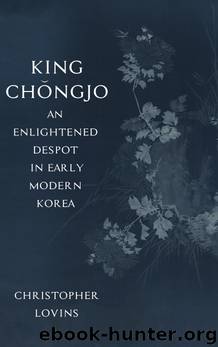King Chongjo, an Enlightened Despot in Early Modern Korea by Christopher Lovins;

Author:Christopher Lovins;
Language: eng
Format: epub
Publisher: State University of New York Press
Published: 2019-03-08T16:00:00+00:00
Slavery
Hereditary slavery in Korea, not abolished in Chosŏn until 1888 (and all slavery not until 1894), had a long history, existing from the start of Koryŏ and probably during the Three Kingdoms as well.86 Chosŏn defenders of slavery stretched back its history still further, claiming it existed from the founding of Korea as one of the Lord of Ji’s eight laws, though the slavery of the Lord of Ji’s law as recorded in the Book of Former Han is clearly not hereditary.87 This connection with the Lord of Ji made it difficult for reformers to argue against it, and when Yu Hyŏng-wŏn did so in the seventeenth century, he declined to address its relationship to the Lord of Ji’s laws altogether.88
Hereditary slavery was a contentious issue at various points throughout the latter half of the dynasty, because private slaves were exempt from both military service and corvée labor and taxes and, thus, were essentially outside the control of the state. It was not until the Imjin War that successive kings succeeded in getting some state control over slaves. On the throne during those invasions, King Sŏnjo directed that slaves be conscripted into mixed units with commoner soldiers, beginning a slow breakdown between slave and commoner that would lead to calls for the outright abolition of hereditary slavery in the eighteenth century. Further, this precedent of slave military service meant that slaves could be assessed the military cloth tax when that tax was assessed in the eighteenth century, though they paid less than commoners.89
Another method the government used to combat the expansion of slavery and increase the state’s access to the country’s human resources was the matrilineal inheritance law, that is, the limitation of the inheritance of slave status to the mother’s line rather than from either parent, but this law’s effect on reducing the number of slaves is mixed at best, and other causes for the marked decline of slavery in the eighteenth century have been cited. Among these are the early modern commercialization of Korea, which meant that the effort expended to recapture runaway slaves was worth less than their labor as against the ready availability of hired labor.90 Chŏngjo did take some steps during his reign to reduce the slave population, with the aim of eventually eliminating hereditary slavery altogether. Like Joseph II, who accepted that aristocratic resistance prevented radical changes to the serf system,91 Chŏngjo knew better than to even attempt to abolish hereditary slavery right away. Instead, he proceeded as he always did, as he had to when taking on the interests of the powerful yangban class who provided the very people expected to execute his policies: in fits and starts, spread out over a long period, protesting all the while that this was what he was forced to do. In his capacity as a judicial legislator—the king being regarded as the source of law in Chosŏn—Chŏngjo usually sided with the weak against the powerful, which included former slaves who were legally commoners but were still expected to treat their former masters with special deference.
Download
This site does not store any files on its server. We only index and link to content provided by other sites. Please contact the content providers to delete copyright contents if any and email us, we'll remove relevant links or contents immediately.
| Africa | Asia |
| Canadian | Europe |
| Holocaust | Latin America |
| Middle East | United States |
Fanny Burney by Claire Harman(25784)
Empire of the Sikhs by Patwant Singh(22172)
Out of India by Michael Foss(16312)
Leonardo da Vinci by Walter Isaacson(11902)
Small Great Things by Jodi Picoult(6095)
The Six Wives Of Henry VIII (WOMEN IN HISTORY) by Fraser Antonia(4790)
The Wind in My Hair by Masih Alinejad(4424)
The Lonely City by Olivia Laing(4120)
The Crown by Robert Lacey(4105)
A Higher Loyalty: Truth, Lies, and Leadership by James Comey(4032)
The Iron Duke by The Iron Duke(3639)
Millionaire: The Philanderer, Gambler, and Duelist Who Invented Modern Finance by Janet Gleeson(3569)
Sticky Fingers by Joe Hagan(3454)
Alive: The Story of the Andes Survivors by Piers Paul Read(3310)
Papillon (English) by Henri Charrière(3269)
Joan of Arc by Mary Gordon(3258)
Stalin by Stephen Kotkin(3084)
Aleister Crowley: The Biography by Tobias Churton(3019)
Ants Among Elephants by Sujatha Gidla(2924)
